News
After two years of war, has Sudan failed its female revolutionaries?
- 16 April 2025
News
SUDAN – “I was scared to see my neighbourhood again after two years of displacement,” said Sulaima, 32, who returned to Khartoum at the end of March. “There were bodies everywhere. I saw the body of a child in front of my house.”
With attacks reported across multiple areas of Sudan, the brutal two-year civil war shows few signs of relenting. Millions are grappling with insecurity, sexual violence, hunger and spiralling poverty; for the country’s women and girls, the fallout has been catastrophic.
The ‘women’s revolution’ of 2019 had brought hope that longstanding rights abuses against women and girls – from restrictive behavioural and dress codes to the threat of sexual slavery used to terrorize dissenters into silence – could be overturned. “Thawra” – revolution – became the rallying cry for thousands of kandakas, the female activists inspired by the bravery of 22-year-old student Alaa Salah, and named after the ancient Nubian queens for their empowerment and strength. Despite the dangers, women made up the majority of protesters.
Yet as horrific reports again proliferate of rape and sexual assault against women and girls, have they been abandoned?
A war on bodily autonomy
Widespread, horrific sexual violence is tearing communities apart and leaving deep scars that will likely take generations to heal. In 2024, there was a staggering 288 per cent increase in demand for gender-based violence response services, with over 12 million people feared to be at risk.
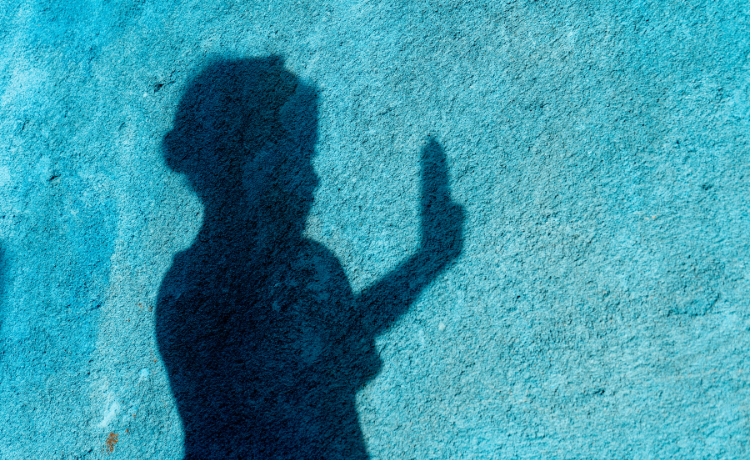
“They came in and pointed a gun at me,” said Aisha*, just 17 years old. “They told me not to scream or say anything – then they began to take off my clothes. One soldier held the gun while the other raped me, and then they took turns.”
These grim statistics reveal entrenched gender discrimination that has enabled a war on the bodies and human rights of its women and girls.
Even before the war, Sudan also had one of the world’s highest rates of child marriage – more than a third of children are wed before they turn 18 – and of female genital mutilation, the majority subjected to the severest form. The risks of both are likely to have increased as social services shutter and families face soaring poverty.
A health sector in ruins
Around 80 per cent of Sudan’s health facilities are not fully operational: Many are forced to walk for hours or even days just to reach the nearest functioning health centre, while women have given birth on the roadside or on the floor of strangers’ homes. Others have died on their way to seek care.
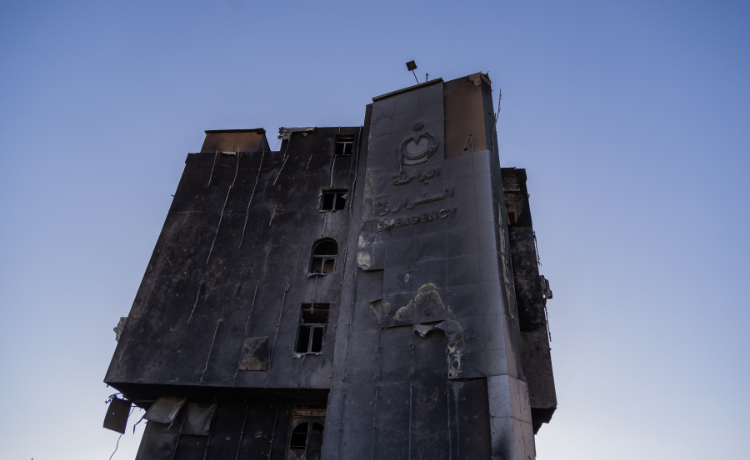
“I fled my village with my neighbour,” said 19-year-old Rokaya in Sennar State. “We are both pregnant and we walked for four days. Eventually, she couldn’t walk any further. I had to leave her behind.”
“When I arrived at the camp, I was terrified and exhausted,” Rokiya continued. “A midwife came to my tent and gave me the care I needed. Later, I was transferred to a hospital, where I gave birth to my baby boy. I still hope my neighbour is safe – I don’t know what happened to her.”
UNFPA is providing the Sennar Hospital with solar panels so electricity can keep powering life-saving equipment, even during blackouts, and supporting midwives to ensure emergency obstetric and neonatal care. Wherever possible, the agency is providing health supplies to facilities across Sudan, and deploying midwives and medical staff to areas where these services can be impossible to access.
The horrors of hunger
Famine has been confirmed in ten areas, putting thousands of lives at risk. For women and girls especially, even venturing out to look for food is fraught with the danger of being assaulted, raped, coerced and trafficked.
Malnutrition rates among pregnant women are alarmingly high, leading to weakened immune systems and a higher risk of infections, pregnancy complications and maternal and newborn deaths. Babies born to malnourished mothers are also more likely to be underweight, which can carry lifelong health challenges and a greater risk of them dying in infancy.
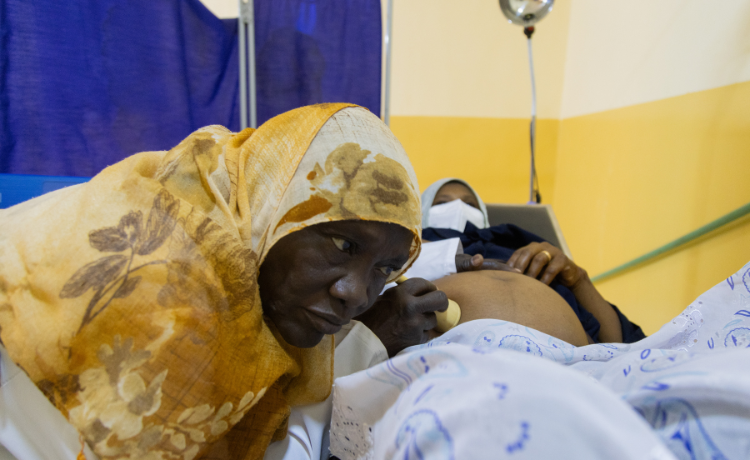
“How could I guarantee the safety of my unborn child, my six children and myself,” said Lubna, a displaced woman from Khartoum. “Who will help me in these terrible circumstances?”
Displaced and in danger
Nearly 13 million people have been forced to flee their homes during the conflict, making Sudan one of the largest displacement crises in the world. Among them are some 270,000 pregnant women with no safe place to call home or give birth – and over 90,000 are due to give birth in the next three months.
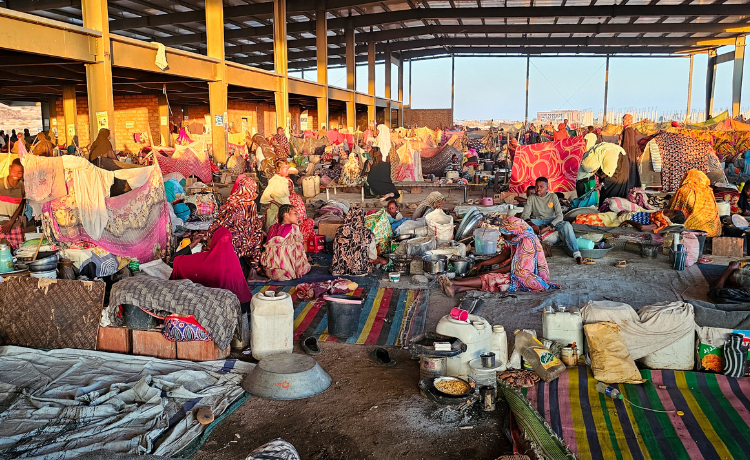
They must do so without skilled health workers, clean supplies, or even shelter. As a result, complications during pregnancy and childbirth and maternal death rates are rising.
“I worry about the cold and not having a proper place to lay my baby,” Sabreen Abdulrahman, a mother of four, told UNFPA. “We don’t have a home – we sleep on the floor. A mobile clinic examined me and performed an ultrasound. They treated me kindly.”
Restarting with nothing
The scars of war are visible everywhere: Homes and hospitals looted and destroyed, streets hidden by rubble, entire neighbourhoods without electricity or running water. For those trying to return home from other areas or countries, the sense of loss is overwhelming.
“I fled Al Jazirah and arrived in Gedaref with nothing but my phone,” said Sarah, 23. “I had to sell it just to afford sanitary pads and some clothes.”
In Khartoum, Sulaima was able to see a doctor at a UNFPA-supported clinic, in spite of the destruction she found upon her return. “My home is empty, nothing is left,” she said. “But I will stay here. I don’t want to live in a shelter anymore.”
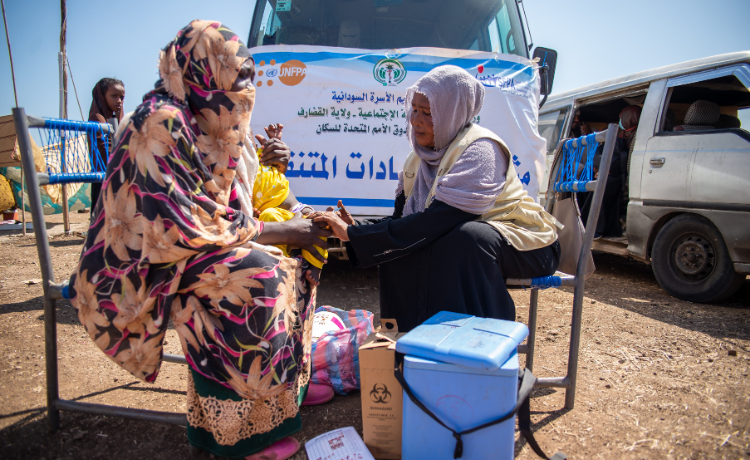
Throughout the war, UNFPA has continued delivering essential health and protection services for women and girls, with midwives, health workers, and outreach teams putting their lives in danger to care for the most vulnerable.
“Midwives in Khartoum were taking huge risks to reach women in their homes,” explained Hawaa Ismael, a midwife at the UNFPA-supported Kararai Health Centre. “Movement was restricted, even for health workers. Some days, I delivered four babies in a single day. It was exhausting, working day and night, but it’s our duty, and I’m proud of what we’ve done.”
Advocating for inclusion
Since April 2023, UNFPA has worked with women-led organizations and local partners to meet the needs of over 750,000 people, including through 64 safe spaces for survivors of gender-based violence and 71 mobile health teams.
In 2025, UNFPA is calling for $119.6 million for its humanitarian response in Sudan, but severe funding cuts mean that some 475,000 women risk no longer being able to access essential sexual and reproductive health services.
“What we urgently need is global action, commitment and funding,” said UNFPA Executive Director Dr. Natalia Kanem. “The world must not turn its back on the women and girls of Sudan.”